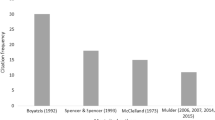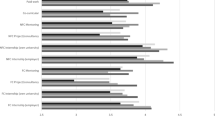Abstract
Higher education is being encouraged to provide the graduates needed by commerce and industry in order to ensure economic development and enhance competitiveness. Throughout Europe and America, recent findings indicate that employers show a preference for teamwork, communication, and self-skilIs above knowledge, degree classification, intelligence, and reputation of the institution the graduate attended. Progressively less emphasis on traditional degrees and more on the validation of competence is clearly discernible. But the question persists: Are our higher education institutions meeting the challenge? Employing a large-scale extensive questionnaire, this study explores student and academic staff views within a higher education institution in the U.K. Results indicate that while staff and students ascribe equal importance to key generic skills, they differ in their views of the extent to which a number of such skills are currently being developed through course content. It is time for higher education to address explicitly the issue of the place of transferable skis in the curriculum. This problem is not unique to Europe. Indeed, the need for a concerted effort by teachers and policymakers in higher education to help rebuild American workforce competence has been repeatedly highlighted. Development work in this area should be a priority.
Similar content being viewed by others
REFERENCES
Ali, F. (1988). Communication and transferable personal skills for engineering students. Bulletin of Teaching and Learning 1 (September): 19-20.
Allen, M. J., and Scrams, D. J. (1991). Careers of Undergraduate Psychology Alumni. Paper presented to the 99th Annual Convention of the American Psychological Association, San Francisco, August 16–20.
Banta, T. (1991). Critique of a Method for Surveying Employers. Paper to the 31st Association for Institutional Research (AIR) Annual Forum, San Francisco, May 26–29.
Barden, L. (1987). Transferable Personal Skills and Value-Added Outcome Assessment. London: Committee of Directors of Polytechnics.
Barden, L. (1989). UK Polytechnic Higher Education: The essential role of competence. Industry and Higher Education, March, pp. 37-42.
Binks, M., Grant, A., and Exley, K. (1993). Assessing the output of institutions of higher education: A pilot study. In L. Harvey (ed.), Proceedings of the Second QHE Quality Assessment Seminar, December 16–17, Birmingham, QHE, pp. 18-28.
British Telecom (BT) (1993). Matching Skills: A Question of Demand and Supply. London: BT.
Brooks, G. et al. (1991). Enterprise in Higher Education (Second Year National Evaluation) Final Report. Slough: NFER.
Burrows, A., Harvey, L., and Green, D. (1992). Is Anybody Listening? Employers' Views on Quality in Higher Education, 2nd ed. Birmingham: QHE.
Cannon, T. (1986). View from industry. In G. C. Moodie (ed.), Standards and Criteria in Higher Education. Guilford: Society for Research into Higher Education (SRHE) and NFER/Nelson, pp. 145-156.
Cleaver, T. (1991). Which do you think are the most important qualities to look for in new graduates? IBM Graduate Recruitment Brochure.
Confederation of British Industry (CBI) (1991). Survey of Students' Attitudes: 17 and 18 Year Olds Going on to Higher Education. London: CBI.
Council for Industry and Higher Education (CIHE) (1987). Towards a Partnership: Higher Education—Government—Industry. London: CIHE.
Council for Industry and Higher Education (CIHE) (1991). Towards a Partnership: The Business Contribution to Higher Education. London: CIHE.
Davies, G. (1993). HEFCE quality assessment methodology: How it addresses employer-education links, In L. E. Harvey (ed.), Proceedings of the Second QHE Quality Assessment Seminar, December 16–17, Birmingham, QHE, pp. 32-36.
Department of Trade and Industry and Council for Industry and Higher Education (DTI/CIHE) (1990). Getting Good Graduates. London: HMSO.
Dineen, L. C., and Blakesly, B. C. (1973). Algorithm AS62: A generator for the sampling distribution for the Mann-Whitney U statistic. Applied Statistics 22: 269-273.
Dutton, T. (1985). Response of the Standing Conference of Employers of Graduates (SOCEG) to the Green Paper on the Develpoment of Higher Education in the 1990s. London: SCOEG.
European Commission (EC) (1991). Memorandum on Higher Education in the European Community, Nov. 5. Brussels: Commission of the European Communities Task Force. Human Resources, Education, Training, Youth.
Green, S. (1990). Analysis of Transferable Personal Skills Requested by Employers in Graduate Recruitment Advertisements in June 1989. Sheffield: University of Sheffield.
Greenwood, R. G., Edge, A. G., and Hodgetts, M. (1987). How do managers rank the characteristics expected of business graduates? Business Education 8(3): 30-34.
Harvey, L. (1993). Quality Assessment in Higher Education: The Collected Papers of the QHE Project. The University of Central England in Birmingham: QHE.
Harvey, L., Burrows, A., and Green, D. (1992). Criteria of Quality. Birmingham: QHE.
Her Majesty's Inspectorate (1991). Survey of Employers: A Report by HMI. London: DES (38/92/NS)
Industrial Research and Development Advisory Committee of the Commission of the European Communities (IRDAC) (1990). Skills Shortage in Europe: IRDAC Opinion. Brussels, EC: IRDAC.
Institute of Directors (IOD) (1991). Performance and Potential: Education and Training for a Market Economy. London: Institute of Directors.
Institute of Manpower Studies and the Association of Graduate Recruiters (IMS/AGR) (1991). Graduates Salaries Add Vacancies: 1991 Summer Update Survey. London: IMS/AGR.
Johnstone, D. B. (1994). College at work: Partnership and the rebuilding of American competence. Journal of Higher Education 65(2): 168-182.
Kalkwijk, J. P. (1991). Quality Assurance in Higher Education in the Netherlands. Paper presented at the Hong Kong Council for Academic Accreditation International Conference on Quality Assurance in Higher Education, Hong Kong, July 15–17.
Khawaja, S., et al. (1991). Technical Education: Its Relevance to Job Market. A Research Report. AEPAM Research Study, no. 90. Islamabad, Ministry of Education: Academy of Educational Planning and Management.
Kirby, D. A., and Mullen, D. (1990). Developing enterprising graduates. Journal of European Industrial Training 14(2): 27-32.
Lindley, R. (ed.) (1981). Higher Education and the Labour Market. Guilford: Society for Research in Higher Education (SRHE).
Marchello, J. M. (1987). University and industrial development. Industry and Higher Education, Sept. 10–14.
National Advisory Board and University Grants Committee (1984). Higher Education and the Needs of Society. London: HMSO.
National Board of Employment, Education and Training Higher Education Council (NBEETHE) (1992). Skills Required of Graduates: One Test of Quality in Australian Higher Education. Canberra: Australian Government Publishing Service.
National Foundation for Educational Research (NFER) (1991). Enterprise in Higher Education: Second Year National Evaluation. Slough: NFER.
Nuttgens, P. (1988). What Should We Teach and How Should We Teach It? Aims and Purposes of Higher Education. Wildwood House, UK: Society for Research in Higher Education (SRHE).
O'Leary, J. (1981). A crisis of our manufacturing. Times Higher Education Supplement 450: 8.
Oxford Centre for Staff Development (1989). Developing Students' Enterprise Skills, A Series of Workshops for Lecturers, Oct–Dec. Oxford, England: Oxford Polytechnic.
Policy Studies Institute (PSI) (1990). Britain's Real Skills Shortage. London: PSI.
Porter, L. W., and McKibben, L. E. (1988). Management Education and Development: Drift or Thrust into the 21st Century? New York: McGraw-Hill.
Squires, G. (1990). First Degree: The Undergraduate Curriculum. London: Society for Research into Higher Education (SRHE).
Standing Conference of Employers of Graduates (SCOEG) (1985). What Employers Look for in Their Graduate Recruits. London: SCOEG.
Stoddart, J. M. (1991). Speech at CBI Conference on Higher Education, November 21, 1991.
Szczepura, A. K. (1990). Determining the Skills Training Needs of NHS Graduate General Management Trainees. Health Services Management Research 3(3): 193-207.
Teichler, U. (1989). Research on higher education and work in Europe. European Journal of Education 24(3): 223-247.
Thompson, J. (1993). The enterprise curriculum: Attitudes of graduates and employers to personal skills for the workplace. Irish Business and Administrative Research 14(1): 81-94.
Trades Union Congress (TUC) (1989). Skills 2000. London: TUC.
Whetten, D. A., and Cameron, K. S. (1984). Developing Management Skills. Glenview, IL: Scott Foresman.
Author information
Authors and Affiliations
Rights and permissions
About this article
Cite this article
Leckey, J.F., McGuigan, M.A. Right Tracks—Wrong Rails: The Development of Generic Skills in Higher Education. Research in Higher Education 38, 365–378 (1997). https://doi.org/10.1023/A:1024902207836
Issue Date:
DOI: https://doi.org/10.1023/A:1024902207836




